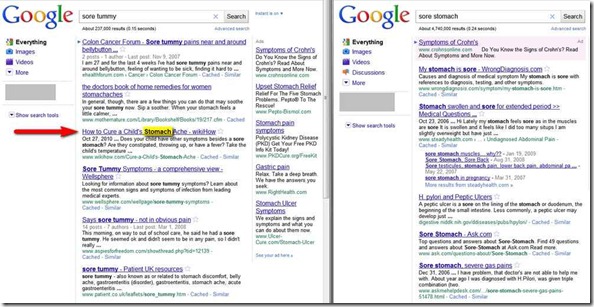Deciphering how Google ranks websites and determines its Search Engine Results Pages (SERP) is the focus of Search Engine Optimization, or SEO. Numerous SEO professionals and SEO consultants offer ongoing advice to website publishers about how to get webpages to rank higher in Google search rankings, with the goal being to attain the coveted #1 ranking on Google for a specific keyword.
To that end, there are numerous SEO advice blogs, and plenty of Google search engine analysis tracking websites published around the Internet. To help them out, or to correct misconceptions in the SEO community, Google relies on various backchannels such as unofficial Google search spokesman Matt Cutts, and to a lesser extent, posts on the official Google blog.
Some of the information offered about how Google ranks webpages and how its search algorithm calculates website rankings is straightforward and well supported by independent observations and data. In other cases, information about search engine results ranking is obtuse, whether deliberately ambiguous or not. And, in some cases, the official party line about how Google’s search engine rankings work seems contrary to the weight of the evidence. In these cases, there is a question about whether the information on a particular topic is fully legitimate, or if it serves to further the Google mythology.
Keyword Variants and Synonyms In Search
Google has maintained through both official and unofficial channels that its search engine takes into account synonyms both when finding webpages that match search queries and when ranking those results on a particular search’s SERPs.
Despite this proclamation, it seems that Google does not take into account synonyms when ranking search results or when choosing what websites to display as results. Make two searches with two different synonyms and you get very different results. For example, search for "sore tummy" and "sore stomach" and you get completely different webpages displayed, and those two words are about as close as synonyms get. Granted one is more colloquial, or even slang, than the other, but is in no way uncommon or regional.
That third result for the sore tummy search has some promise, but if you click through, the keyphrase "sore tummy" occurs twice on the page suggesting that it ranks less because Google recognized the synonym, stomach, in the title, and more because it has the word, tummy, on the webpage.
Google Webmaster Tools and Writing Online
If you are going to make money writing online, or just develop enough traffic to get your stuff read by more than your mom, a basic understanding of how Google works and how to use SEO in your writing is necessary.
One of the basic Google tools for online writers and publishers is Google Webmaster Tools. The webmaster tools show several different elements of a website and, most importantly, how Google perceives them. For example, one report shows how Google’s index perceives your keywords. The report shows what keyword appears the most often within your website. This is useful information because you may inadvertently be using a word so often that it overshadows your true intention.
The #1 keyword on ArcticLlama’s freelance writing business website is "writes."
What is interesting is a recent addition to Google Webmaster Tools that displays how many "variants" of that word appears. For example, for ArcticLlama Freelance Writing, there are two variants. They are writes and writing.
In other words, Google’s search engine algorithm and indexing spiders are grouping together the words, writes and writing.
Does that mean that searches for those variants will be more similar?
Not really, but at least we know what Google is thinking, or trying to think.
Other important information to be analyzed by writers from Webmaster Tools is what words are NOT variants. For example, while, writes and writing, are variants, writer is not. However, writer, writer’s, and writers are "variants," although, in reality, they are the plural and the possessive of the same word. Just like, writes and writing, are not synonyms, but rather different tenses of the same verb.
If these so-called variants are what Google considers to be "synonyms," then we have an explanation for Google search results that do not take synonyms into account. Perhaps, Google considers different tenses, possessives, and plurals of words to be synonyms when they say that they use them in searches. That is not an accurate definition of synonym, but Google is run by techies, not by writers, publishers, or editors.
Whether the keyword variants have anything to do with Google synonyms in searches or not is conjecture. What is not, is that the Keywords tool in Google Webmaster Tools is a useful service for writers optimizing their writing for search. If you want to rank for both writer and writing, then you need to be using those words and their variants in your text, because, as the Keywords variant list shows, they won’t count as the same thing to Google’s index building spiders.

I agree completely. For ranking variants counts as different keywords for google.